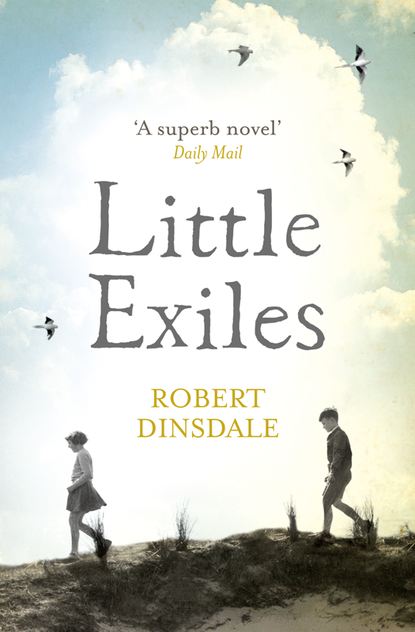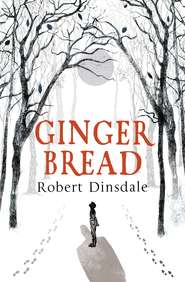По всем вопросам обращайтесь на: info@litportal.ru
(©) 2003-2024.
✖
Little Exiles
Автор
Год написания книги
2018
Настройки чтения
Размер шрифта
Высота строк
Поля
He might wonder about it further, but he hears them again: the man in black, and Ernest’s little voice drowned out underneath. They might be anywhere behind him; the voices seem to curl from every direction, borne on flurries of desert sand. Perhaps, he begins to think, the men in black are their own kind of fence, watching out for boys slipping through to pick them up in the nothingness beyond.
He crashes back through the shadow wood. Things skitter in the trees, but he pays them no mind. He only scrambles on, overjoyed to see the orbs of the border fires burning in the Mission beyond.
The darkness is almost absolute when Jon Heather crashes back into the Mission. On the opposite side of the untilled field, the dairy sits empty but for the goats milling within. Further on, the first wave of boys is already emerging from the dining hall, bellies full of gristly goat. Jon hangs at a distance and sees George among them, hands shoved in pockets, head tucked into his chin. He wants to call out, run over and fling his arms around the fat boy, but instead he looks over his shoulder. Other figures have emerged from the shadow wood now: the man in black, with Ernest propelled in front of him. If Ernest has been crying, Jon cannot see. He waits until they pass, and then waits longer. He does not have to follow to know where they are going, but he follows all the same. Soon he is standing at the centre of the Mission, where the column of sandstone huts marks a big cross. The man in black takes Ernest through a door, and then they are gone.
‘Jon Heather, you missed dinner!’
Jon turns to see George gambolling towards him.
‘Well?’
‘Well what?’
‘Well, why did you miss your dinner?’
Jon wants to tell him. There’s nothing out there, George. There’s only more nothing, as far as the eye can see – nothing in the north and nothing in the south and nothing in the east and nothing in the west. That’s why they brought us here – a nothing place for nothing people.
He wants to say all of this, but he cannot. He could never describe the yawning terror of standing there, knowing that, even if you ran and ran, you wouldn’t get any further away. There isn’t a boy who would believe it if he didn’t see it for himself.
‘What happened to your hands?’ George suddenly asks.
Jon looks down. It still looks as if he is wearing scarlet gloves.
‘It’s nothing, Georgie. I was working.’
‘It’s nearly bedtime, you know …’
Jon feels his feet rooted to the spot. ‘I’ll be along, George. I’ll catch you up.’
George folds his arms. ‘What are you up to?’
‘It’s …’ Jon turns, feigns a big smile. ‘I didn’t finish my work,’ he lies. ‘They say I can’t go to bed until it’s done, or I’ll have to go for Judah Reed.’
George’s lips curl. ‘Rotten old Judah Reed,’ he whispers, conspiratorially. ‘Can’t I help?’
Eventually, George is convinced and scurries for the shelter of their dormitory. It would not do, he knows, to be caught out after dark, not with cottage mothers and men in black drifting around, looking for lurkers.
Now that he is alone, Jon is suddenly afraid. He hears, dimly, one of the cottage mothers rounding up little ones as if they are stray chickens, clucking after them as she forces them up into their shacks. They will come for him soon enough, demanding to know why he has not also retired. If he was missed at dinner, somebody will know; somebody will ask questions, and he doesn’t know what he’ll say.
Once silence has settled over the Mission, he hears the faint sound for which his ears have been straining. He drops to his haunches, eyes fixed on the sandstone door, and tracks along the wall, trying to discern the exact spot from which the noises come.
Somewhere, in there, a boy is crying. It is, Jon Heather knows with a terrifying certainty, Ernest who is making those sounds.
The noise comes in fits and starts. Ernest bleats out, and then there is silence; Ernest screams that he is sorry, and then he is still. Every time Jon thinks it is over, it comes again, and soon he begins to notice a pattern in the sound, a rhythm, as if Judah Reed is a conductor and Ernest his orchestra.
Then, without warning, the sounds just stop. Jon listens out for them, realizes that he desperately wants to hear. As long as Ernest is crying, at least he knows Ernest is still alive. Yet now there is only silence: dull and absolute.
Suddenly, the door twitches and opens. Jon springs to his heels, ready to dart into the stretching shadows, but he is too late. Ernest appears before him, the man in black hovering above.
Judah Reed has a hand on each of the little boy’s shoulders, and he ruffles his hair as he sends him on his way. ‘You’ll be a good boy,’ he says, gently leading Ernest down the step and onto the bare earth. ‘Good boys make good men.’
Ernest walks forward, stiff and deliberate. His head is down, but still he seems to see Jon staring. Now, his steps grow longer. He is, Jon understands, trying to run, but something is stopping him. Dumbly, Jon watches him go.
When Jon looks back, Judah Reed has come closer, to fix him with a curious gaze.
If you were clever, Jon Heather, you would run yourself. If you were as clever as you think you are, you might have hidden in the shadow wood while the man in black escorted Ernest back into the Mission – and then, safe in the knowledge that the lookout was gone, you could have carried on running into the big bleak nowhere.
Judah Reed looks down at him, along the line of his crooked nose. ‘Let me see your hands,’ he says.
Jon could not resist, even if he wanted to. A force he does not know compels him to stand up, and he finds his hands coming out of his pockets, his fists unfurling to reveal those blood-red palms.
Judah Reed crouches and takes Jon’s hands, one at a time, in his own. It seems as if they are both wearing gloves: Judah Reed’s, monstrous and leathery; Jon’s, tiny and red.
‘It was a very good goat,’ says Judah Reed. A smile blossoms on his face. ‘You did a very good job. You fed the whole Mission. I hope you are proud.’ He pauses. ‘Are you proud, boy?’
There is a look in Judah Reed’s eyes like fire, a look that tells Jon: there is only one answer to this question. Being ashamed, he sees, is not an option. So he nods, because nodding is all he can do.
‘Some of the boys in this Mission could learn a thing or two from you. Australia will be grateful that you came.’
‘It won’t come off,’ blurts out Jon. His inside crawls, for surely he should be petrified, surely he should want to take flight – but, strangely, he finds that he wants to be here. It is the most peculiar sensation. There are a thousand things he wants to ask. It is, he realizes, only Judah Reed who really knows the way across the big bad nowhere and back to England. ‘I scrubbed and scrubbed but it wouldn’t come off.’
Judah Reed says, ‘It never does,’ and, smiling, returns through the sandstone door.
VI
Two days later, Judah Reed leads them in a Sunday service and, afterwards, they are permitted to write letters. In the assembly hall, Jon finds a seat at a long trestle table, and begins to dream of an opening sentence. At the far end, one of the cottage mothers looming on his shoulder, George wriggles onto his stool and stares, puzzled, at his paper.
Jon throws a look around the room and sees, for the first time, that none of the older boys of the Mission have come. He wonders why they do not care about writing to their mothers – and then he feels George’s sticky hand on his shoulder.
The little boy is standing beside him, stubby pencil in his fist.
‘You’ll have to sit down, George. If one of them sees …’
‘What can I write, Jon?’
Jon shuffles over, offering George half of his stool. Eagerly, George flops down, almost upending Jon.
‘Will I write to the Home, do you think?’ he wonders. ‘Or Peter?’ He stops. ‘Where would I write to Peter, do you think?’
Jon looks into George’s expectant eyes, recalls vividly that morning in the Home when George was crying behind the chantry.
‘You can write to my mother, if you like.’
Jon lifts the pencil out of George’s fingers and pushes it back in, the right way round.
‘What will I say?’
‘I don’t know, George. It’s your letter.’






